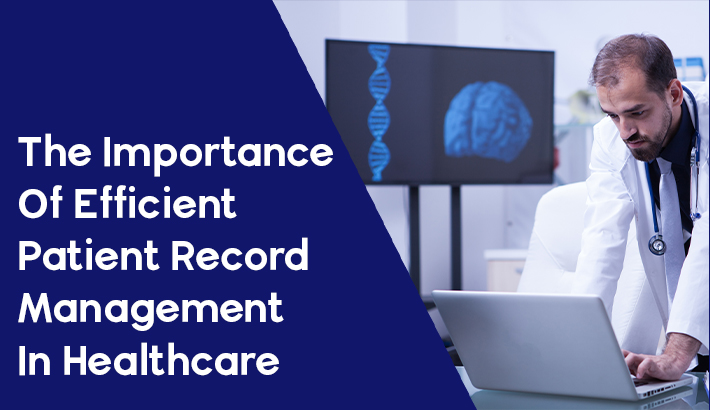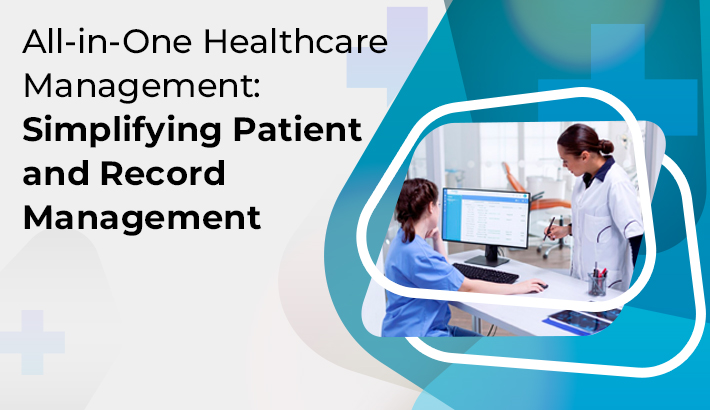Mobile health, commonly known as mHealth, stands at the forefront of healthcare transformation, reshaping the way we manage patient information and records. Its evolution over the years has marked a significant shift in healthcare practices. This article explores the journey of mHealth, uncovering its advantages, addressing challenges, and envisioning future trends. From real-time patient monitoring to the digitalization of medical records, mHealth has not only streamlined healthcare processes but has also redefined the dynamics of doctor-patient relationships. As we navigate through the advantages of improved communication and accessibility, we witness mHealth's far-reaching impact on public health, bridging gaps, and offering a glimpse into the future of healthcare delivery.
Introduction to Mobile Health (mHealth)
In the dynamic landscape of healthcare, the advent of Mobile Health (mHealth) stands as a transformative milestone. Over recent years, the fusion of mobile technology with healthcare practices has birthed mHealth, a comprehensive term embracing a diverse array of applications and services. Its overarching goal is to elevate both medical and public health outcomes. With the omnipresence of smartphones and the evolution of wearable devices, mHealth ingeniously utilizes technology to not only bolster patient care but also to revolutionize the management of health records. This integration heralds a new era, where accessibility and efficiency converge, promising a future where healthcare is not just a service but an experience shaped by the seamless synergy of human touch and technological innovation.
The Evolution of mHealth
The evolution of mHealth, or Mobile Health, represents a fascinating journey at the intersection of healthcare and technology. In the early 2000s, the concept emerged timidly with the introduction of the first health-related mobile apps. Over the years, this field has undergone a remarkable transformation, fueled by rapid technological advancements. From basic applications to sophisticated platforms, mHealth has become synonymous with innovation in patient care and record management.
Today, it encompasses a diverse range of tools, from real-time monitoring through wearable devices to comprehensive health apps. This evolution signifies a shift from conventional healthcare practices to a digital era where accessibility, portability, and real-time insights take center stage. The integration of mHealth into our healthcare landscape reflects not just a technological progression but a paradigm shift in how we approach and experience healthcare, promising a future where personalized and efficient healthcare is within the grasp of everyone.
Advantages of mHealth in Patient Management
Mobile Health (mHealth) has transformed patient management in remarkable ways, leveraging the power of technology to enhance healthcare outcomes. Here are key advantages of mHealth in patient management:
1. Real-Time Monitoring:
mHealth enables continuous, real-time monitoring of patients' vital signs and health parameters. Wearable devices and mobile apps empower healthcare providers to track data such as heart rate, blood pressure, and glucose levels remotely. This facilitates early detection of anomalies and allows for timely interventions, preventing potential health issues.
2. Improved Communication:
The seamless communication facilitated by mHealth tools has bridged the gap between patients and healthcare providers. Secure messaging platforms and telemedicine apps allow individuals to consult with their doctors, discuss treatment plans, and seek medical advice from the convenience of their homes. This not only enhances accessibility but also strengthens the doctor-patient relationship.
3. Digitalization of Medical Records:
The transition from traditional paper-based records to digital health records is a game-changer. mHealth ensures that medical records are easily accessible, portable, and secure. Electronic Health Records (EHRs) streamline the storage and retrieval of patient information, reducing errors and providing a comprehensive overview of the individual's medical history.
4. Empowering Patients in Chronic Disease Management:
mHealth has proven to be a valuable ally for individuals managing chronic diseases. Specialized health apps provide resources for self-monitoring, medication adherence, and lifestyle management. Patients can actively participate in their healthcare journey, leading to improved disease management and an enhanced quality of life.
5. Enhanced Efficiency in Emergency Response:
In emergency situations, mHealth plays a critical role in improving response times and efficiency. Emergency responders can access vital health information quickly, enabling them to make informed decisions. This rapid exchange of information contributes to more effective emergency care, potentially saving lives.
Overall, the advantages of mHealth in patient management go beyond convenience; they represent a paradigm shift towards proactive, personalized, and efficient healthcare. As technology continues to evolve, the impact of mHealth on patient outcomes is likely to expand, ushering in a new era of accessible and patient-centric healthcare.
Record Management Revolutionized
Record management has undergone a revolutionary transformation with the advent of Mobile Health (mHealth). In the past, managing medical records was often a cumbersome process involving extensive paperwork and limited accessibility. However, the integration of mHealth technologies has ushered in a new era of efficiency and accessibility.
Digitalization of medical records has become the cornerstone of this revolution, allowing for the seamless storage, retrieval, and sharing of vital health information. With the shift from traditional paper-based systems to electronic health records (EHRs), healthcare providers can now access comprehensive patient histories in an instant.
This not only reduces the risk of errors but also ensures continuity of care, as patients can easily access their records anytime, anywhere. The portability and accessibility afforded by mHealth have truly revolutionized patient record management, creating a more streamlined and patient-centric approach to healthcare.
Challenges in Implementing mHealth
Implementing Mobile Health (mHealth) brings forth a slew of opportunities, but it's not without its challenges. Let's dive into the key hurdles faced in the journey of integrating mHealth into the healthcare landscape.
1. Digital Divide: Bridging the Gap in Access
Despite the widespread use of smartphones, not everyone has equal access to these technologies. The digital divide presents a significant challenge, as certain populations, particularly in underserved areas, may lack the necessary devices or connectivity for mHealth initiatives.
2. Data Privacy Concerns: Safeguarding Sensitive Information
As mHealth involves the collection and storage of sensitive health data, ensuring robust data privacy measures is paramount. Concerns about unauthorized access, data breaches, and misuse of health information pose challenges in building and maintaining patient trust.
3. Interoperability: Creating a Seamless Ecosystem
The diverse array of devices, applications, and platforms in the mHealth landscape often lack standardized interfaces. Achieving interoperability is a challenge, as seamless communication and data exchange between different systems are essential for a cohesive and efficient mHealth ecosystem.
4. Regulatory Compliance: Navigating a Complex Landscape
The healthcare industry is subject to stringent regulations, and mHealth is no exception. Navigating complex regulatory frameworks, such as the Health Insurance Portability and Accountability Act (HIPAA), adds a layer of complexity to mHealth implementation. Compliance is crucial to protect patient data and avoid legal complications.
5. User Adoption and Engagement: Encouraging Participation
Convincing both healthcare providers and patients to embrace mHealth solutions can be a challenge. Resistance to change, lack of awareness, and concerns about the reliability of technology are common obstacles. Effective strategies for user education and engagement are essential to ensure the successful adoption of mHealth practices.
Addressing these challenges head-on is crucial for unlocking the full potential of mHealth in transforming patient care and healthcare management.
Success Stories of mHealth Implementation
Mobile health (mHealth) has witnessed remarkable success stories, particularly in the realm of remote patient monitoring. This transformative technology enables healthcare professionals to monitor patients in real-time, a game-changer for those managing chronic conditions. Through wearable devices equipped with sensors, individuals can have their vital signs continuously tracked, allowing for early detection of anomalies and timely intervention. This not only enhances the quality of care but also reduces hospitalizations, contributing to improved patient outcomes and a better quality of life.
Moreover, health apps designed for chronic diseases have empowered patients to actively participate in their healthcare journey. These applications provide resources for self-monitoring, medication adherence, and lifestyle management, turning smartphones into powerful tools for health management. The success of mHealth in these areas underscores its potential to revolutionize patient care and make a substantial impact on public health.
Future Trends in mHealth
As we navigate the ever-evolving landscape of healthcare, the future trends in Mobile Health (mHealth) are poised to redefine the way we approach well-being. Artificial Intelligence (AI) will play a pivotal role in personalized patient management, leveraging data analytics to predict health risks and recommend tailored interventions. The seamless integration of mHealth with wearable devices is set to revolutionize health monitoring, empowering individuals to actively engage in preventive care. These devices, from smartwatches to fitness trackers, will provide continuous real-time data, fostering a proactive approach to health.
Additionally, advancements in virtual reality (VR) and augmented reality (AR) are anticipated to enhance the remote patient-doctor interaction, bridging geographical gaps and ensuring access to expert advice. The future of mHealth holds the promise of a more interconnected, data-driven, and patient-centric healthcare ecosystem, shaping a healthier and more accessible future for all.
Impact on Doctor-Patient Relationship
The integration of Mobile Health (mHealth) has brought about a profound transformation in the doctor-patient relationship. With the advent of mHealth, communication between healthcare providers and patients has become more dynamic and collaborative. Through secure messaging platforms and telemedicine apps, patients now have direct access to their healthcare professionals, fostering regular and open dialogue. This enhanced communication not only allows individuals to seek medical advice conveniently but also promotes a sense of empowerment and engagement in their healthcare journey.
Moreover, mHealth encourages shared decision-making, turning patients into active participants in determining their treatment plans. This shift towards a more interactive and patient-centric approach strengthens trust, improves treatment adherence, and ultimately contributes to more positive health outcomes. The doctor-patient relationship, once confined to the confines of a clinic, is now evolving into a partnership marked by accessibility, communication, and mutual involvement in healthcare decisions.
Regulatory Framework and Security Measures
In the ever-evolving landscape of mobile health (mHealth), establishing a robust regulatory framework and stringent security measures is paramount. The regulatory landscape, often guided by frameworks like the Health Insurance Portability and Accountability Act (HIPAA), ensures the privacy and confidentiality of patient information. Adherence to these regulations is not just a legal obligation but a fundamental aspect of building and maintaining trust between healthcare providers and patients.
Security measures within the mHealth ecosystem extend beyond legal compliance. The encryption of sensitive health data, secure transmission channels, and access controls are essential components of safeguarding patient information from unauthorized access or breaches. Regular updates and proactive measures to address emerging security threats contribute to the resilience of the mHealth infrastructure. This dual commitment to regulatory compliance and advanced security protocols establishes a foundation for the responsible and ethical deployment of mHealth technologies in the healthcare domain.
The Role of Mobile Health in Public Health Initiatives
In the realm of public health, Mobile Health (mHealth) plays a pivotal role in transforming initiatives and improving overall well-being. By leveraging the ubiquity of mobile devices, mHealth contributes to disease surveillance through real-time data collection, aiding in the swift response to infectious diseases.
Furthermore, mHealth serves as a powerful tool for health promotion and education, delivering targeted information to individuals and communities. Its impact extends to bridging healthcare gaps, especially in remote areas, where virtual consultations and mobile clinics bring essential services closer to those in need.
In rural healthcare, mHealth interventions prove invaluable, connecting communities with healthcare professionals for timely diagnosis and treatment. As a catalyst for positive change, mHealth emerges as a driving force in advancing public health goals, making healthcare more accessible, informed, and responsive to diverse needs.
The Global Reach of mHealth
In the far reaches of our globe, where traditional healthcare infrastructure is limited, Mobile Health (mHealth) emerges as a beacon of hope. With the power to bridge profound healthcare gaps, especially in remote and underserved areas, mHealth pioneers a revolution in accessibility. Through virtual consultations, telemedicine, and the innovative concept of mobile clinics, it extends a healing touch to individuals facing formidable barriers to healthcare access.
Rural areas, often characterized by a scarcity of medical facilities, witness a transformative wave through mHealth interventions. Mobile clinics, armed with the capabilities of telemedicine, become a lifeline for communities that were once distanced from timely medical attention. The impact is tangible – timely diagnoses, efficient treatment, and a renewed sense of well-being. In these spaces, mHealth transcends technological innovation; it becomes a force for equity, ensuring that quality healthcare is not a luxury but a fundamental right for all.
Case Studies Illustrating Positive Outcomes
Reduced Hospital Readmissions: mHealth interventions, such as post-discharge monitoring through mobile apps, have shown to reduce hospital readmissions. Timely interventions based on real-time data contribute to better post-treatment outcomes.
Efficient Emergency Response: In emergency situations, mHealth facilitates swift communication between emergency responders and healthcare providers. Access to critical health information enables responders to make informed decisions, improving the efficiency of emergency care.
Conclusion
In conclusion, the transformative impact of Mobile Health (mHealth) on patient and record management is unmistakable. As we navigate this digital healthcare frontier, the advantages of real-time monitoring, enhanced communication, and streamlined record accessibility become increasingly evident. While challenges such as privacy concerns and technological barriers persist, the success stories and future trends of mHealth paint a promising picture. The symbiotic relationship between patients and healthcare providers evolves, fostering shared decision-making and improved healthcare outcomes.
As mHealth continues to bridge gaps in global healthcare, it propels us towards a future where personalized, accessible, and efficient healthcare is not just a possibility but a reality. Embracing the potential of mHealth is not just a technological shift; it's a commitment to a healthier, more connected world.
FAQs
Q1. Is mHealth only for tech-savvy individuals?
A. No, mHealth applications are designed to be user-friendly, and efforts are being made to bridge the digital divide for equitable healthcare access.
Q2. How secure are my health records in mHealth apps?
A. mHealth apps adhere to strict security measures, including encryption and HIPAA compliance, to ensure the confidentiality and integrity of health records.
3. Can mHealth really improve healthcare in rural areas?
A. Yes, mHealth has shown significant success in improving healthcare delivery in rural areas by providing virtual consultations and mobile clinics.
4. Are all health apps reliable?
Not necessarily. It's important to choose mHealth apps that are certified and regulated to ensure the reliability of the information and services they provide.
Q5. How can I ensure the privacy of my health data in mHealth apps?
By choosing apps that prioritize and comply with privacy regulations like HIPAA, and being cautious about sharing sensitive information.




